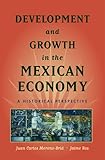Development and growth in the Mexican economy : a historical perspective / Juan Carlos Moreno-Brid, Jaime Ros.
Material type: TextPublication details: Oxford ; New York : Oxford University Press, 2009. ISBN: 9780195371161 (cloth : alk. paper); 019537116X (cloth : alk. paper)Subject(s): Geschichte 1820-2009 | Wirtschaft | Mexico -- Economic conditions -- 19th century | Mexico -- Economic conditions -- 20th century | MexikoDDC classification: - Online resources: Click here to access online | Click here to access online | Click here to access online
TextPublication details: Oxford ; New York : Oxford University Press, 2009. ISBN: 9780195371161 (cloth : alk. paper); 019537116X (cloth : alk. paper)Subject(s): Geschichte 1820-2009 | Wirtschaft | Mexico -- Economic conditions -- 19th century | Mexico -- Economic conditions -- 20th century | MexikoDDC classification: - Online resources: Click here to access online | Click here to access online | Click here to access online Oxford scholarship online Economics and Finance
Includes bibliographical references (p. 279-304) and index. 5050 1: Introduction-Aim and scope of the book-Overview-2: Origins Of Backwardness: Obstacles To Economic Development In The 19th Century-Economy of New Spain on the eve of independence-Economic decline and political instability: the origins of backwardness-Liberal misperceptions in the mid-19th century?-Mexico's decline in international perspective-3: Porfiriato And The Beginnings Of Modern Economic Growth-Order and progress-Expansion of the railway network and integration of the domestic market-Financial capital and foreign investment-Institutional modernization and the international environment-Modernization with inequality-Limits and downfall-4: Revolution, The 1930s, And The Consolidation Of A Developmental State-Revolution and the emergence of a new social pact-Revolution and its aftermath: demographic consequences and economic changes-Recession and depression from 1926 to 1932-Economic recovery and industry-led growth from 1933 to 1940-Consolidation of a developmental state under Cardenas-Overall performance (1910-1940) and a comparative perspective-5: Golden Age Of Industrialization-Trade, industrial, and financial policies-War boom (1941-1945)-Growth with a devaluation-inflation cycle (1946-1955)-Development with macroeconomic stability (1956-1970)-Long-term productivity performance and the pattern of growth-Modernization with inequality revisited-Golden age in an international perspective.
6: Loss Of Macroeconomic Stability, The Oil Boom, And The Debt Crisis -- From shared development to two-digit inflation and the 1976 currency crisis -- Oil boom, 1978-1981 -- 1982 debt crisis -- Interpretations of the internal causes of the 1976 and 1982 crises -- 7: Years Of Adjustment, The Lost Decade, And The Reform Process -- Years of adjustment and stabilization -- Mexico's adjustment in the Latin American context -- Lost decade -- Reform process -- 8: Shift In The Market-State Balance And The Quest For Export-Led Growth -- Privatization and economic efficiency -- Trade liberalization, industrial policy reform, and the quest for (nonoil) export-led growth -- Deepening agricultural dualism -- Financial liberalization, the capital surge, and the 1994-1995 peso crisis -- Weak state -- 9: Social Policy, Poverty, And Inequality -- Increase in social spending and the rise of targeted antipoverty programs -- Trends in inequality and poverty -- Poverty reduction, slow growth, and the demographic dividend -- Difficult tasks of social policy -- 10: Why Has Post-Reform Growth Been Disappointing? -- Mexico's development gap -- Trade expansion without export-led growth -- Is productivity performance the culprit for the growth slowdown? -- Human capital formation and the growth slowdown -- Low investment, slow growth -- Liberal misperceptions at the turn of the century? -- 11: Conclusions -- Appendix: Historical series of economic and social indicators -- References -- Index.
From the Publisher: This book is the first comprehensive and systematic English-language treatment of Mexico's economic history to appear in nearly forty years. Drawing on several years of in-depth research, Juan Carlos Moreno-Brid and Jaime Ros, two of the foremost experts on the Mexican economy, examine Mexico's current development policies and problems from a historical perspective. They review long-term trends in the Mexican economy and analyze past episodes of radical shifts in development strategy and in the role of markets and the state. This book provides an overview of Mexico's economic development since Independence that compares the successive periods of stagnation and growth that alternately have characterized Mexico's economic history. It gives special attention to developments since 1940, and it presents a re-evaluation of Mexico's development policies during the State-led industrialization period from 1940 to 1982 as well as during the more recent market reform process. This reevaluation is critical of the dominant trend in economic literature and is revisionist in arguing that, in particular, the market reforms undertaken by successive Mexican governments since 1983 have not addressed the fundamental obstacles to economic growth. Development and Growth in the Mexican Economy also details the country's pioneering role in launching NAFTA, its membership in the OECD, and its radical macroeconomic reforms. Carefully argued and meticulously researched, the book presents a wide-ranging, authoritative study that not only pinpoints problems, but also suggests solutions for removing obstacles to economic stability and pointing the Mexican economy toward the road to recovery.
roy


There are no comments on this title.